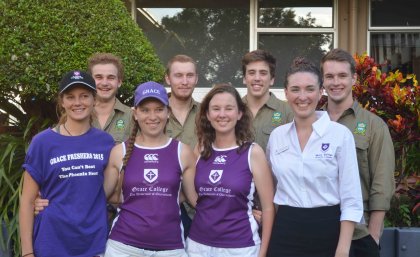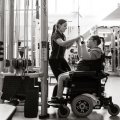
Mental health, sexual identity and religion – topics often considered taboo – will be the focus of discussions during orientation activities at two residential colleges at The University of Queensland.
St Leo’s College and Grace College will host two days of workshops and lectures for returning residents, in order to support their social education.
St Leo’s Head of College Mr Steve Foley said the Orientation Week workshops included sessions on mental health, sexual identity, LGBTI awareness and inclusion as well as information on living in a Christian community.
“We have experts coming in to facilitate discussions on those topics that usually get swept under the rug, with a goal of making sure that our residents know how to identify issues, where to get help and understand what’s expected of them,” he said.
“We want to make sure we have a diverse and respectful community. Education and clarity on issues such as dealing with stress and being inclusive and issues relating to sexual consent are an important part of building a healthy community.
“This is the first year we’ve run activities specifically focussed on these issues and we feel it’s relevant not just to our residents, but to young people worldwide.”
The Pillow Talk Project will be one of many interactive workshops on offer.
Presenter Nina Funnell said the workshop would focus on sex-positivity and invite participants to share their opinions on issues including alcohol, hooking-up, cultural values and the law.
“We know that topics like alcohol and consent generate a lot of questions for students and that many students graduate from high school and enter university having never been formally taught much about consent or communication in relationships,” she said.
“Giving students the opportunity to discuss and reflect on the nature of relationships, dating and hook-ups, especially in the university and college environment and with the involvement of alcohol, is hugely important for student safety and wellbeing.
“Over the past several decades, research has consistently shown that many young Australians experience unwanted sex or sexual contact that they were unsure how to navigate.
“We also know that attitudes about gender, relationships, dating and sex directly link to rates of sexual assault/unwanted sex.
“We hope to help move the conversation forward. Understanding the laws around consent is important, but the law sets a very low bar in terms of respectful interaction.
“Sessions like these are really important as they provide students with an opportunity to consolidate and share what they already know, while also creating a safe and friendly space for them to learn from one another about issues they are unsure of.
“Creating that space and starting that dialogue is really important to developing healthy attitudes and ethical behaviour in young people, while also reducing the prevalence of unwanted sex on campus.”
Ms Funnell said the St Leo’s and Grace Colleges’ program was an innovative initiative.
“While many other colleges around Australia are still struggling to come to terms with these issues, it’s fantastic to see these colleges tackling them head on, and taking a leadership role in these issues,” she said.
“Most of all, it’s empowering for students to know their rights, and the types of supports that are in place on campus and beyond.
“Supporting students to develop respectful relationships at this point in their lives is not only helpful in the immediate future – it’s also setting them up for long-term success.”
The sessions will be held on 26 and 27 February at St. Leo’s College, UQ.
Media: Shona Clayton, S.Clayton@stleos.uq.edu.au, 3144 3515.



